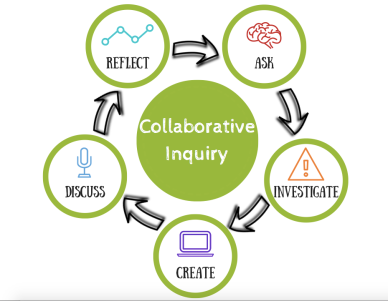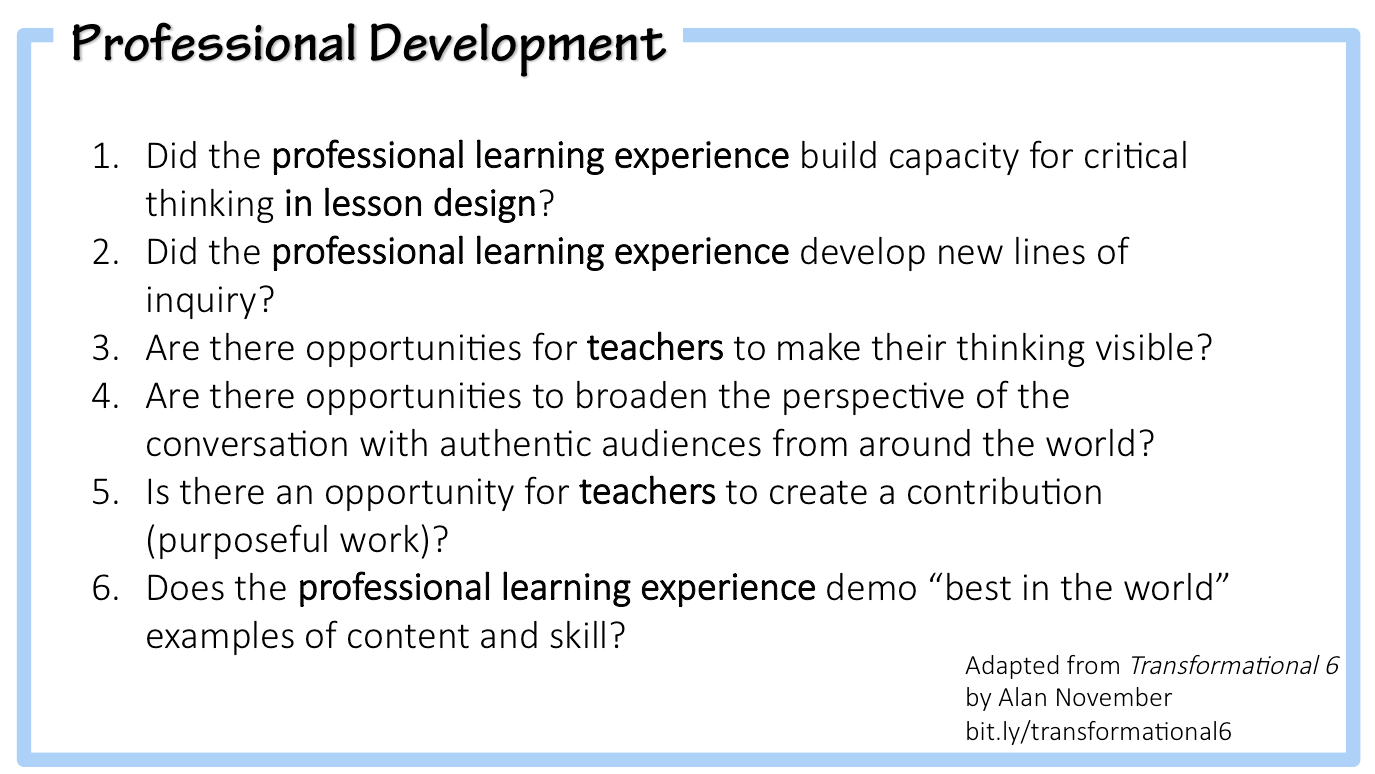Utilizing a First Five Days style to set the tone for powerful, engaging and self-directed learning, I am working to model those descriptors of the premises of Article V: Organizational Transformation within the Implementation Matrix to support school transformation. My goal is to meaningfully engage my educators in their own professional growth as key decision makers.
V.c The overall quality of the present teaching force is excellent, and most teachers are capable and willing to take on their new designer role if their sense of moral purpose for entering teaching is honored, and if they are provided relevant development opportunities and a climate and conditions that support them.
This school year I worked to transition to a model of professional development that emphasizes collaborative inquiry, rather than a more traditional approach. In comparison to traditional professional learning, the inquiry model establishes teachers in an active role in designing and experiencing learning. Teachers work in collaboration with peers, exploring and reflecting on new knowledge and making a commitment to a change in practice.
Traditional vs. Collaborative Inquiry Educator Professional Development
|
Traditional |
Collaborative Inquiry |
|
Pre-determined agenda |
Team-created agenda |
|
Generic norms or expectations |
Team-created norms |
|
Little to no response to participants’ previous experiences |
Opportunity for educators to tell their story and consider the story of others |
|
Inflexible means to gain new knowledge |
Open to multiple means to gain new knowledge |
|
Possible opportunity for educators to make connections to previous learning |
Opportunity for educators to make connections to previous learning |
|
Little to no opportunity for educators to demonstrate understanding |
Opportunity for educators to create evidence of understanding for an authentic audience |
|
Little to no follow up |
Opportunity for educators to reflect on their change in practice as a result of new understanding |
Within any form of learning, such as with students in classrooms or educators in professional development, the inquiry cycle looks the same: questions are asked, an investigation is performed, a plan is created, communication is utilized, and a reflection ensures change. Collaborative inquiry involves a team, working toward a common purpose and the cycle includes 5 stages:

- ASK: Who are we as a team of teachers? What do we need to learn?
- INVESTIGATE: In what ways can we gain new knowledge?
- CREATE: How can we demonstrate understanding?
- DISCUSS: What connections can we make?
- REFLECT: How does our new understanding change our practice?
The initial meetings this year of our district Instructional Coaches as well as my Elementary Mathematics Content Specialists were designed to yield responses to the following in order to articulate Stage 1 of the inquiry cycle:
- What do you want to learn as a Coach this year?
- What are our norms for a healthy team?
- Where, how, and when do we learn?
- What makes you proud?
- School would be so much better if…
- Who am I? What is your story?
In addition, we kicked off a book study to tap into Stage 2 – gaining new knowledge. The book study discussions are posted on our Learning Management System (LMS) and the prompts are designed to promote authentic experiences, modeling high levels of application and practice. I have adapted the Transformational 6 by Alan November, written for innovation of student assignments, into consideration of professional development experiences for educators. These 6 questions guide my design for innovative professional development and challenge my planning to provide tasks for my educators that promote purposeful, quality work.

It is evident that this work to transform professional development parallels the work of the educators in the classroom making the same purposeful changes in their design of learning experiences. I will continue to consider, reflect, adjust, and improve professional development for my educators with a goal of providing relevant development opportunities and a climate and conditions that support them.
To read more about transforming professional development in this way, check out Collaborative Inquiry and Educator Professional Development, by Mary Kemper, available on iBooks.

Leave a comment